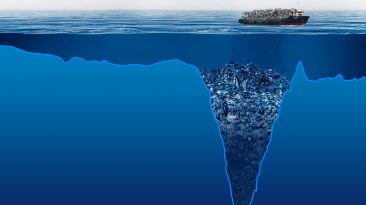Movies love quicksand. And why not? It’s exotic, it’s dramatic, and it’s highly exaggerated.
Fun fact: it’s impossible to become fully submerged in quicksand. But what could happen to you?
The reason why you don’t normally sink into the sand when you go at the beach is due to a physics phenomenon known as force chain. Basically, when a bajillion grains of sand are jammed together in one place, their weight gets distributed over a large area, keeping you and your camels safely above ground.
But if any water happens to seep up from underground, it will mix with the sand to create a surface that looks solid, but isn’t…
It’s true that real quicksand isn’t like what you see in the movies. The reason why you won’t sink right through is because quicksand is rarely more than a few feet deep. And even if it was deeper than that, humans are only half as dense as quicksand, so really, you couldn’t sink much lower than your waist.
That is, unless you struggle. Quicksand is a non-Newtonian fluid, meaning its viscosity changes under stress. In high stress conditions, like being under the weight of your body, quicksand changes.
It becomes liquid, causing you to sink. So if you panic, and start frantically trying to get out, the rapid shifting of your weight will only suck you down deeper and faster. On the other hand, quicksand gets thicker over time. So if you just hang out and do nothing, it’ll be harder for you to get out.
Every minute you’re stuck in quicksand increases the risk you’ll suffer from dehydration, starvation, sun stroke, or hypothermia. And if that doeesn’t give you chills, those hungry looking eyes might.
Depending on where you are, you might even drown! Quicksand is often found near the sea because it’s easier for water to rise up through the sand. So if you’re ever caught in the coast, be sure to keep an eye on the time. At best, you’ll only have six hours before the tide changes.
But if not trying to escape, and trying too hard, are both bad choices, then what are you supposed to do if you get stuck in quicksand?
The trick is to stay calm. First, get rid of any heavy items that you’re wearing or carrying, as they’ll only drag you deeper. Then, try to lean as far back as you can to create more space for yourself.
Water will come in and fill the gaps you create, which will make it easier for you to move and pull your body towards the surface. If you can, grab a stick and wedge it underneath your back; this will help to increase your leverage.
Hopefully, you’ll get help from emergency services. But if not, you can use these tips to get out on your own.
It will be a long and exhausting process since, just to free your foot from a puddle of quicksand, moving at a rate of one centimeter per second, it would require the same amount of force as it does to lift a small car.
And once you’re free, you’ll probably be in a lot of pain. With all that pressure from the densely packed sand, you might emerge from the quicksand with permament nerve damage, or without a leg.
If you do manage to come out in one piece, well, maybe tread a little more carefully in the future. But don’t let this one sucky experience keep you from another adventure.
Sources
- “What Is Quicksand? Learn How To Escape It”. Helmestine, Anne Marie, 2019. Thoughtco. Accessed July 24 2019.
- “The Physics Of Quicksand”. Bellows, Alan, 2019. Damn Interesting. Accessed July 24 2019.
- “Quicksand Science: Why It Traps, How To Escape”. Nicholas, Bakalar, 2005. news.nationalgeographic.com. Accessed July 24 2019.
- “Slate’S Use Of Your Data”. 2019. Slate Magazine. Accessed July 24 2019.
- “Hiker Trapped In Utah Quicksand Recalls Harrowing Ordeal”. Reavy, Pat, 2019. deseretnews.com. Accessed July 24 2019.



























